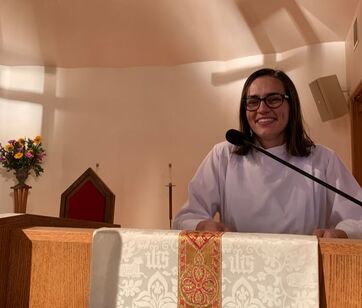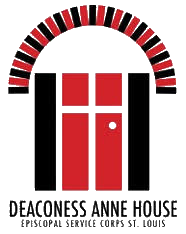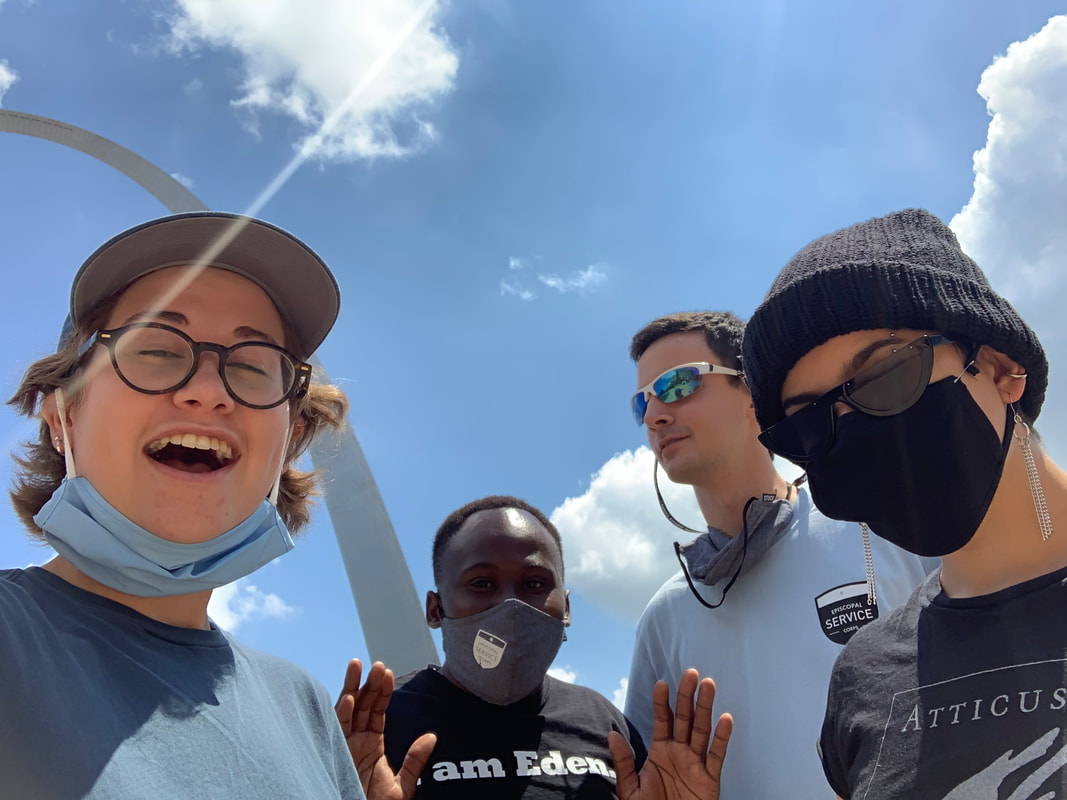 A Sermon by Corps Member Erin O'Rourke for the Fifth Sunday of Easter, May 15th, 2022 based on John 13:31-35 at St. Timothy's in Creve Coeur, MO. Good morning everyone! My name is Erin, and this year, I’ve been serving as a corps member at Deaconess Anne House in St. Louis. I want to thank Rev. Camie for inviting me to preach this morning.
There’s a question I think about a lot: Since God loves us, what does this mean for the way we live? What should we do differently now that we’ve witnessed God’s love poured out to us through the life of Jesus? It’s a huge question and it’s one that I definitely can’t answer by myself. Thankfully Jesus answers this question in our reading from the Gospel today. To provide a bit of context, this portion of John’s Gospel takes place at the last supper-- Jesus’ last meal with his group of disciples on earth. Jesus knows that Judas has just left the group of to betray Jesus-- an act that he knows will lead to his death on the cross. However, rather than speaking to the group in anger or hurt, Jesus shares some final words with his disciples. He tells them that though he will soon be leaving them, their work of glorifying God on earth does not end. He gives them a new commandment about how to live in the world: “Just as I have loved you, you also should love one another.” And at first, that commandment might sound simple: love one another. Easy, right? I love all kinds of things and people: I love coffee, I love sunny weather, I love my friends, I love my sisters. But simple as that commandment might sound, Jesus isn’t calling us to love each other like we love mere things, or even as we might love our friends. He’s calling us to love each other as he loved us. Jesus’ love for us is so great, that even as we crucified him-- sending him to a brutal death, he overcame that death and invited us into eternal life. Jesus’ love is so great that even as one of his closest friends betrayed him, he responded not out of anger, but with hope. Jesus’ love is so great that even as humanity continues to distance itself from God by destroying the planet and failing to care for the vulnerable, God calls us back, again and again, insisting that we can change and do better. It’s an amazingly powerful love. Now thankfully, Jesus doesn’t begin and end his talk of love there, leaving us to determine how we can interpret it in our life. Earlier that same evening, Jesus made his teaching about love concrete. He humbled himself and washed his disciples’ feet, telling them that if he, their Lord and teacher, washed their feet, they should also do the same to each other. Through these words and actions, Jesus shows his disciples that serving each other in small, everyday ways is an act of love. At another point in the Gospel of John, Jesus also tells the disciples that there is no greater love than to lay down your life for your friends-- which in his case literally means death. Yet, Jesus doesn’t only ask us to love our friends or even our families. No, he asks us to do something harder-- to love everyone in our community as he loved us, laying down his life for us. When we take these teachings on love together, we learn that God is asking us to show care and concern for other people, in both big and small ways, taking the risk of loving even when people may not always show that same love back to us. I’ve been grateful to have many people in my life who have shown love to me-- family, friends, and a partner. This year I also have experienced love in a different way-- in an intentional Christian community. Last spring, I graduated from college and decided to spend the next year living and serving at Deaconess Anne House in St. Louis. Deaconess Anne House is a program of the Episcopal Service Corps, where young adults commit to spend a year living together, praying daily, sharing meals, living under a rule of life, and serving at various local nonprofits and churches. In the months I’ve spent in this community, I’ve learned so much about how we can receive God’s love from others and show it to the people in our midst. When I entered into community life, I knew I was committing to living alongside three near-complete strangers, as well as forming relationships with our director and deacon. Long before meeting each other in person, we had individually committed to living under a Rule of Life. Though we knew we’d write the Rule together, we had no idea what its specifics would be or who exactly the people we’d be keeping it with were. Our rule of life, based loosely on the rules that Benedictine monks use to order their communities, lays out the ways we live out our values through daily actions. As a community, we committed to a year of listening to God’s will in our lives and following it, living simply, and creating stability for each other. These commitments have meant showing up for each other every day and serving each other-- through mundane tasks like sharing meals and chores, through shared acts of worship and daily prayer, and through committing to supporting each other on a deeper level-- through vulnerable sharing about our own faith, feelings, needs, and hopes for the future. These commitments have meant listening to the needs of the neighborhood and city around us and seeking to serve others with humility. We committed to spending at least this year prioritizing the needs of our community over our own needs, offering this year to each other as a chance to learn and grow in love together. Just in the past few months, my housemates have driven all the way across St. Louis when I lost my keys at my placement site late one night, made time and space for me to rest in the midst of my first holy week working for a church community, and listened for days on end, asking thoughtful questions as I tried to sort out questions of vocational discernment. In the beginning, it was hard to imagine what that might look like nearly nine months later. Together, we’ve gone through some amazing times, and some really hard ones-- we’ve cared for each other in times of illness and health, through uncertainty about the future, and figuring out plans for after our year together ends. We’ve been with each other through significant losses, and as we’ve made new friends and connections. We’ve learned how to respond when others go through stressful times, and how to communicate better about what we need from each other. We’ve also had support from so many people-- our director, Michaelene, and Deacon, Dayna, our host families, prayer pals, and parishes like St. Tim’s. All of these people and organizations showed us the meaning of community by coming together to teach us, welcome us, and show us ways of loving each other. To me, being part of a community like this one means committing to showing love to others through our actions-- it means making a commitment to be there for other people. Christian community is not limited to people who are able to live together as we do. While it might look different, as a church community, each of you also commits to certain ways of caring for each other and being there for each other. Each week in services, you pray for each other, and in so many ways you offer up your lives to each other. Maybe you’ve driven someone from church to a doctor’s appointment or surgery, brought them food when they’re going through a hard time, or cared for their child or pet in a pinch. In ways as simple as these, you can show God’s love to your family members, friends, neighbors, partner, and people you work with. You can show God’s love to people you never meet, by advocating for justice or creating a better world for people who come after you. Of course, we’ll be in relationships with people who frustrate and annoy us, and with people we disagree with. Yet Jesus sets an example of how to handle this-- he loves humanity despite the many ways we turn away from God’s love. Jesus models staying in relationship with people who hurt him and holding others accountable to move toward a better world. In a similar way, we can’t back out of his command to love others, even when it is difficult. When Jesus speaks to his disciples at the last supper, he invites us to care for each other, support each other, serve each other, and lay down our lives for members of our community. To me, that’s one of the most important ways we can live differently in light of God’s love for us. If God so loved the world that he gave his only son for us, who are we to stand in the way of showing that love to everyone we meet?
0 Comments
Leave a Reply. |
Categories |
|
Mailing address:
DAH c/o Diocese of Missouri 1210 Locust St. Louis, MO 63103 |
(c) 2014 - 2020 Episcopal Diocese of Missouri
|


 RSS Feed
RSS Feed